NYC Housing Authority Paid $708 to Replace a Lightbulb
The no-bid micro contracts awarded to vendors at the center of a bribery scandal are rife with wildly inflated costs, an analysis finds.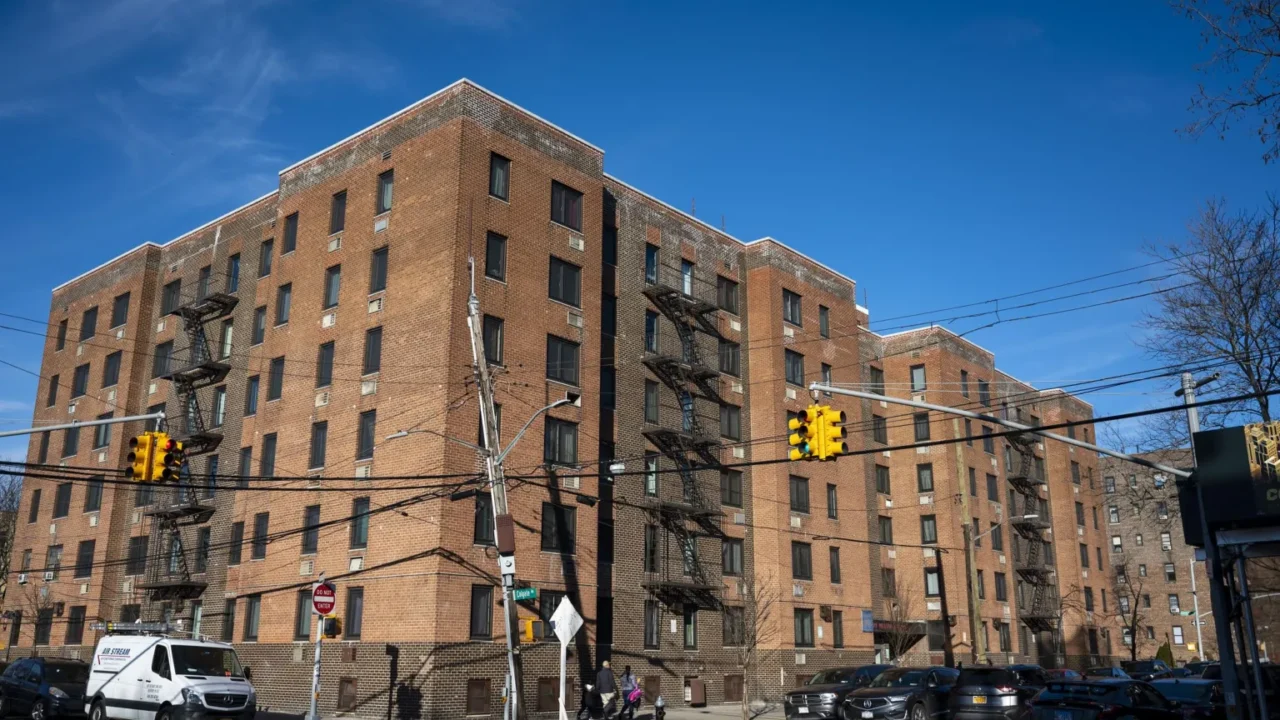 The exterior of 1471 Watson Ave in the Bronx on Friday, February 11, 2022. Credit: Hiram Alejandro Durán/ THE CITY
The exterior of 1471 Watson Ave in the Bronx on Friday, February 11, 2022. Credit: Hiram Alejandro Durán/ THE CITY
How much does it cost NYCHA to change a lightbulb?
In one case, more than $708 per bulb.
That’s the rate the housing authority paid one vendor, who submitted a total bill of $4,250 to replace six LED bulbs and covers at Throggs Neck Houses in The Bronx, according to records reviewed by THE CITY.
Another vendor billed NYCHA $4,985 to replace one door to a compactor room. Yet another charged $4,875 to put in slip resistant rubber treads on a stairway with 15 steps — a cost of $325 per step.
When law enforcement officials arrested 70 current and former NYCHA workers on bribery charges earlier this month, they identified small no-bid contracts for apartment repairs, awarded to select vendors in exchange for cash to superintendents, as the source of corruption.
What prosecutors didn’t say was that many of the bills submitted by the vendors who win these so-called micro-purchase contracts raise serious questions about whether NYCHA wound up paying them hundreds of thousands — or even millions — of taxpayer dollars in inflated costs over the years.
All of these bills had one thing in common, a review of contract data by THE CITY found.
The vendors sought compensation as close to the maximum allowed at the time on each contract, regardless of the work performed. Micro contracts have a built-in incentive for vendors to bill for just below the maximum allowed — $5,000 until late 2019, $10,000 since — no matter what the scope and value of the task at hand is.
The vendors sought compensation as close to the maximum allowed at the time on each contract, regardless of the work performed.
Often the invoices contradicted themselves, with contractors demanding the same amount for different levels of the same work, THE CITY found.
One vendor charged $4,950 to replace 48 LED bulbs and light covers in the Robinson Houses in East Harlem. The same vendor then charged nearly the same amount ($4,980) to replace just 12 LED bulbs and covers at the Throggs Neck Houses in the Bronx. Weeks earlier that same vendor charged slightly less ($4,250) to replace just six LED bulbs and covers at Throggs Neck.
NYCHA approved all of these payments, apparently without noticing the differences in scope of work.
One vendor charged $4,945 to install 860 square feet of drop ceiling in one building in the Jefferson Houses in East Harlem, then charged $4,945 to install just 630 square feet in another Jefferson building. That meant NYCHA paid $5.75 per square foot for tile in one building, and $7.84 per square foot in another building — all within the same development.
NYCHA Was Warned
Several years ago investigators with the independent monitor overseeing NYCHA began red-flagging these suspicious expenses, notifying NYCHA and in some cases referring some vendors to law enforcement. THE CITY first reported in 2019 about corruption concerns tied to the contracts.
The scope of this potential taxpayer ripoff is not known and has, to date, not been made part of the bribery cases brought by the Manhattan U.S. Attorney Damian Williams and the city Department of Investigation.
On Feb. 6 they announced criminal charges against 55 current and 15 former NYCHA staff, in the single largest federal bribery charges filed in one day, alleging they took $2 million in bribes in exchange for handing out hundreds of small no-bid contracts worth $13 million.
NYCHA has justified the use of these no-bid contracts to expedite responses to a huge backlog of repair requests from tenants, reasoning that engaging the competitive bidding process slows down getting the job done.
But NYCHA has been repeatedly warned that it wasn’t properly scrutinizing these contracts and the work by the selected vendors. DOI specifically cautioned that this lack of oversight allows vendors to claim payments far above the cost of the work they were doing.
The scope of this potential taxpayer ripoff is not known and has, to date, not been made part of the bribery cases brought by the Manhattan U.S. Attorney Damian Williams and the city Department of Investigation.
Paying inflated costs cuts further into NYCHA’s overall spending at a time when the authority management face enormous financial pressures as they struggle to bring NYCHA’s deteriorating portfolio of 175,000 apartments up to snuff.
In the fall of 2021 after nine NYCHA contractors were arrested following an undercover sting by DOI, then-DOI Commissioner Margaret Garnett pointed out what she saw as a built-in incentive to inflate bills created by the use of these no-bid contracts.
At the time, the cutoff for a NYCHA micro-contract had been moved from under $5,000 to under $10,000, and the bribes paid by the contractors were always a percentage of the contract amount — usually 20%. That created an incentive for the NYCHA bureaucrat taking the bribe to make his bribe bigger by approving contracts as close as possible to the maximum allowed.
“What we’ve also seen is when anything under $10,000 doesn’t have much oversight there’s a lot of incentive to just say that this job which is a one hour job is actually a $7,000 job,” Garnett told THE CITY. “If the bribe is keyed off the price of the work, everyone has an incentive to inflate as long as it’s under $10,000.”
Corruption in Plain Sight
Sometimes the contrived nature of these bills was obvious.
In one eight-month period of 2019, TEENUSA Construction, a contractor from Richmond Hill, Queens, won 29 micro-contracts for the same amount ($4,851) even though the jobs were at different developments and involved a wide variety of tasks.
Remove and replace three damaged stairwell doors at Throggs Neck Houses in the Bronx: $4,851.
Replace 20 LED bulbs and covers at Whitman Houses in Brooklyn: $4,851.
Install new 1,090 square feet of vinyl commercial tile at the Williamsburg Houses in Brooklyn: $4,851.
Reached Friday by THE CITY, Adnan Lodhi, president of TEENUSA, asked a reporter to call back in three hours and he would answer questions about his firm’s micro-contracting track record. When THE CITY called back as requested, no one picked up the phone number NYCHA lists as Lodhi’s contact number. THE CITY left a message that was not returned.
All of these suspicious invoices were submitted in plain sight, and yet NYCHA approved all of them — raising questions about a lack of oversight that has triggered alarm bells about potential corruption over the last five years.
This lack of oversight, it appears, was the catalyst for this culture of corruption. In September 2019, shortly after THE CITY highlighted the micro-contract potential for corruption, an employee who’d worked for several vendors who’d received hundreds of these contracts reached out to investigators working for Bart Schwartz, the independent monitor who oversees NYCHA.
The informant told the monitor’s team that he’d worked for three companies, including TEENUSA, and described a systematic kickback scheme between vendors and NYCHA superintendents and assistant superintendents.
He said he started as a worker for one vendor but later became a “marketer” for them, visiting NYCHA developments to solicit micro-contract work. He described a cottage industry unique to NYCHA because of what he deemed a lack of quality assurance. Because managers were getting kickbacks, they had zero incentive to question the quality of work they were paying for.
The informant claimed that many of the contractors did not have the required skills to perform the requested work, with some workers learning how to glaze bathtubs, install LED lights and even perform basic plumbing by watching Youtube videos. Much of the work, he alleged, was not up to par.
In one eight-month period of 2019, TEENUSA Construction, a contractor from Richmond Hill, Queens, won 29 micro-contracts for the same amount ($4,851) even though the jobs were at different developments and involved a wide variety of tasks.
In one case, NYCHA paid a firm without a plumbing license to clear sewer pipes — work that often involves cutting and resetting pipes, a task that requires a license. NYCHA got around this problem by telling the vendor to bill for “catch basin cleaning” — a job that does not require a license, the informant said.
At the time the monitor referred the informant to law enforcement and red-flagged a dozen contractors whose micro-contract work looked suspicious, warning NYCHA management about the likelihood of fraud and shoddy work.
Three years later in a report released last week, the monitor noted that work “completed to industry standard remains a hurdle for NYCHA staff and the contractors they engage.” They placed the blame for this squarely on “a lack of supervision and oversight of vendors and NYCHA staff.”
The day of the federal takedown, DOI Commissioner Jocelyn Strauber called for increased scrutiny of vendors put on the pre-qualified list, recommending to NYCHA that these vendors submit to an integrity review of their work histories conducted by NYCHA and DOI before they can be put on the PQL. TEENUSA, for example, is on NYCHA’s most recent pre-qualified list for carpentry work.
Strauber made 14 reform recommendations, including reprising the three recommendations NYCHA rejected in 2021. That includes removing responsibility for awarding small contracts from superintendents, establishing standard cost estimates for 15 typical types of goods and service that serve as templates when awarding these contracts so vendors aren’t charging different amounts for the same work.
NYCHA Chief Executive Officer Lisa Bova-Hiatt says the agency is committed to adopting all 14 of DOI’s recommendations, although some will take longer than others to take effect.
NYCHA and DOI are already collaborating on creating a more aggressive vetting protocol for the pre-qualified lists, and creating a new staffing model that removes superintendents and assistant superintendents from awarding small contracts. NYCHA expects to begin recruiting and training new workers to handle this task in the central office.
NYCHA has created the list of 15 typical goods and services such as the cost of installing LED bulbs and laying down vinyl tile and is now determining the typical costs of this work that vendors will be expected to adhere to. And per DOI’s suggestion, going forward upper management outside of the development where the work is being performed will review all documentation and inspect the work.
Finally NYCHA has begun installing signs at all developments with a pretty straightforward reminder: “Offering, giving and/or accepting bribes, gratuities, and/or gifts is a criminal offense under federal and New York State law.”
They expect all the signs will be up by the close of business Monday.
Your support is crucial…With an uncertain future and a new administration casting doubt on press freedoms, the danger is clear: The truth is at risk.
Now is the time to give. Your tax-deductible support allows us to dig deeper, delivering fearless investigative reporting and analysis that exposes what’s really happening — without compromise.
Stand with our courageous journalists. Donate today to protect a free press, uphold democracy and unearth untold stories.

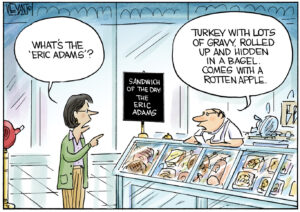
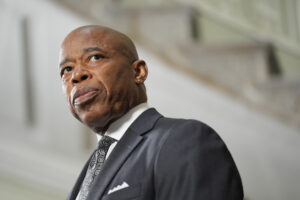

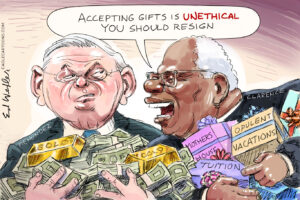
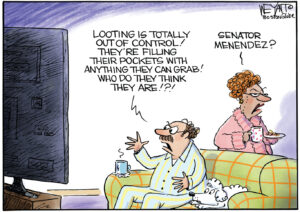
You need to be a supporter to comment.
There are currently no responses to this article.
Be the first to respond.